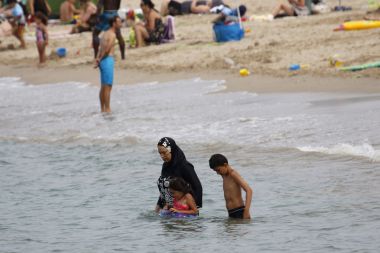France's burkini ban is an insult to all religions and Christians must oppose it

There was something remarkably Orwellian about the sight of French police forcing a Muslim woman to undress on a beach in Nice, all in the name of liberty, equality and fraternity.
Photos have emerged of the woman being confronted by officials and told to remove her long sleeved top that covered her shoulders.
The founding principle of French secularism is that if you create a neutral public space where religion is left in the privacy of one's home, you can remove its undue influence. Without religion, the idea is that a fair and democratic system can be formed.
But something has gone drastically wrong when that principle imposes a dress code and forces people to undress against their will.
"Freedom is slavery," goes the Party's motto in George Orwell's 1984. French liberté is not being able to wear what you want, we could add.
The scene on the beach in Nice is, unfortunately, not an isolated incident. A pork-free option has been banned in some French schools meaning Jewish and Muslim students are told "pork or nothing" when it comes to school dinners.
But it is not just Muslims and Jews that are targeted under France's twisted understanding of secularism. Christians are also affected and must speak out on behalf of all religious voices.
France's attempt to be fair and neutral has become remarkably unfair and biased, but still French politicians fear the public expression of religious belief.
After overthrowing the oppressive elites of the monarchy and the Catholic Church, France built itself on the values of freedom, democracy and equality. Secularism provided the answer to revolutionaries searching for an alternative way to govern without the corruption and violence that religion wreaked across Europe in the 17th and 18th centuries.
A safe, neutral space, devoid of religion was the answer.
That was and still is the philosophy of secular France, but this grand vision of secularism has clearly failed.
It is time for French politicians to rethink what secularism means. Rather than banning religion from the public sphere, France should welcome it as one voice alongside many others in a genuinely diverse and multicultural society. Religion is a part of human identity and understanding, and it cannot be ignored.
"If you want a picture of the future, imagine a boot stamping on a human face – forever," wrote Orwell.
Part of humanity's "face", whether France likes it or not, is religion. The continued exclusion of religion in public life is a grave mistake and can only be rectified by a complete rethinking of what secularism actually is.
Only if all religious, non-religious and anti-religious views are held on an equal footing, can France avoid Orwell's ever-fitting prophecies.











